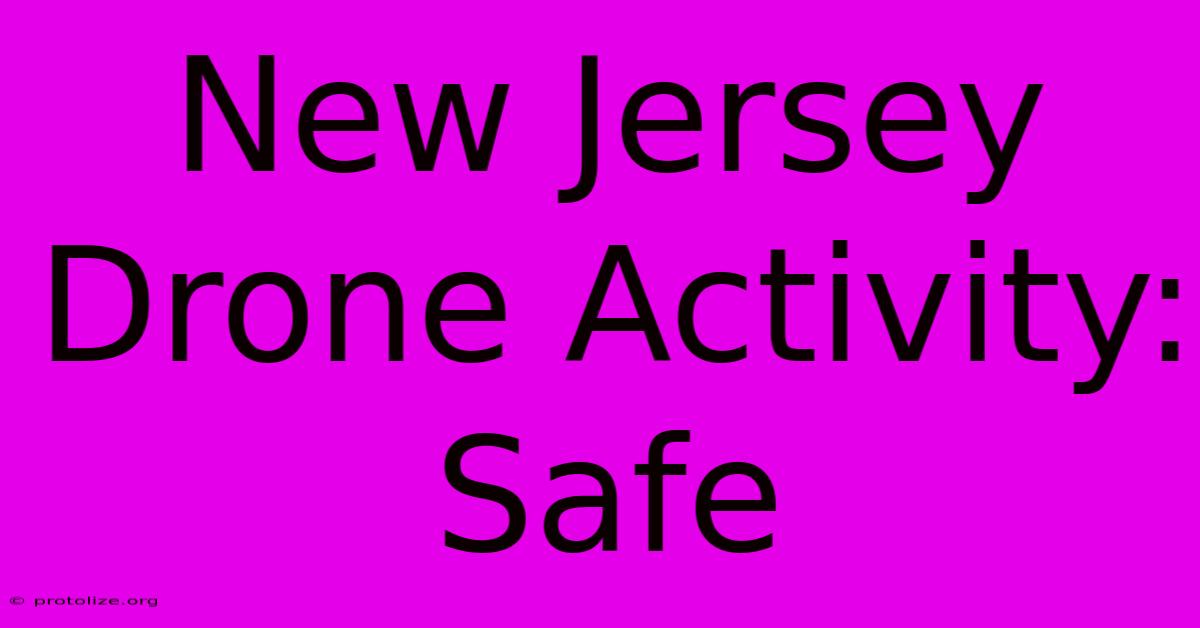New Jersey Drone Activity: Safe

Discover more detailed and exciting information on our website. Click the link below to start your adventure: Visit Best Website mr.cleine.com. Don't miss out!
Table of Contents
New Jersey Drone Activity: Safe and Responsible Flight
The buzz around drones is undeniable. These unmanned aerial vehicles (UAVs) offer incredible opportunities for photography, videography, surveying, and more. But with this exciting technology comes the crucial need for safe and responsible operation, especially in a densely populated state like New Jersey. This guide will cover essential aspects of safe drone operation within New Jersey, helping you fly legally and responsibly.
Understanding New Jersey Drone Laws
Before you even think about taking flight, familiarize yourself with New Jersey's drone regulations. These laws align with, and often expand upon, Federal Aviation Administration (FAA) rules. Here's a breakdown of key points:
FAA Registration:
- Mandatory: If your drone weighs over 0.55 pounds (250 grams), you are legally required to register it with the FAA. This involves a simple online process and provides a unique registration number for your drone.
Drone Certification (Part 107):
- Potentially Required: For commercial drone operation (meaning any use for profit or compensation), a Remote Pilot Certificate (Part 107) from the FAA is mandatory. This certificate requires passing a knowledge test demonstrating proficiency in safe drone operation. Even for recreational use, consider the Part 107 certification. It demonstrates a high level of competence and could reduce insurance costs.
Know Your Airspace:
- Critical: Before each flight, check the airspace using resources like the FAA's B4UFLY mobile app or website. This helps you avoid restricted airspace around airports, military bases, and other sensitive areas. Unauthorized entry into restricted airspace can result in hefty fines and legal repercussions. Familiarize yourself with the term "LAANC" (Low Altitude Authorization and Notification Capability) – a system for authorizing drone flights in controlled airspace.
Privacy Concerns:
- Respectful Flying: New Jersey, like many states, has privacy laws that need to be considered when operating a drone. Avoid flying over private property without permission. Photographing or filming individuals without their consent can lead to legal issues. Always be mindful of others' privacy.
Safe Drone Operation Practices in New Jersey
Beyond the legal aspects, safe drone operation hinges on responsible piloting practices.
Weather Conditions:
- Assess Before Flight: Never fly your drone in inclement weather. High winds, rain, snow, or fog can significantly impact drone stability and control, increasing the risk of accidents. Check weather forecasts before each flight and only fly when conditions are favorable.
Battery Life:
- Always Monitor: Never let your drone's battery run completely dry. Always monitor the battery level during flight and return to your launch point with sufficient battery reserve to ensure a safe landing.
Visual Line of Sight:
- Maintain Control: Maintain visual line of sight (VLOS) with your drone at all times. Never fly beyond your visual range, as this makes controlling the aircraft significantly more difficult and potentially hazardous.
Drone Maintenance:
- Regular Checks: Regularly inspect your drone for damage or wear and tear. Ensure propellers, motors, and other components are in good working order before each flight.
Emergency Procedures:
- Be Prepared: Know how to perform emergency procedures such as emergency landings or battery failures. Practice these procedures in a safe, open area to build your confidence and reaction time.
Resources for Safe Drone Flight in New Jersey
Several resources can help you stay informed and up-to-date on New Jersey drone regulations and best practices:
- FAA Website: The official website of the Federal Aviation Administration provides comprehensive information on drone regulations and certifications.
- New Jersey State Police: Check for any specific state-level regulations or announcements related to drone operations within the state.
- Local Aviation Authorities: Contact local airports or air traffic control towers for information on airspace restrictions in your specific area.
By following these guidelines, you can contribute to a safe and enjoyable drone environment in New Jersey. Remember, responsible drone operation is not just about adhering to the law but also about being mindful of others and ensuring the safety of your drone and those around you. Fly safely!

Thank you for visiting our website wich cover about New Jersey Drone Activity: Safe. We hope the information provided has been useful to you. Feel free to contact us if you have any questions or need further assistance. See you next time and dont miss to bookmark.
Featured Posts
-
Nancy Mace Assaulted Trans Accusation
Dec 13, 2024
-
No Good Deed Recap Episode One
Dec 13, 2024
-
Kraven Review Crowes Laborious Hunt
Dec 13, 2024
-
Furniture Manufacturer Erp
Dec 13, 2024
-
Gouts Clementine A Black List Adaptation
Dec 13, 2024
